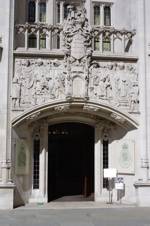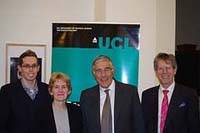January 2011 - March 2015
The Constitutional Reform Act 2005 provided the backdrop for the project, which has been studying the changes since the Lord Chancellor was replaced as head of the judiciary by the Lord Chief Justice, and the judiciary have become a more independent and self-governing branch of government. This AHRC-funded project was titled The Politics of Judicial Independence in Britain’s Changing Constitution. In phase 1 of the project, from 2011 to 2013, we did most of the research, including over 150 interviews to understand the changing relations between the judiciary, government and Parliament. Phase 2, the dissemination phase, has seen a host of dissemination activities in 2014 and 2015. In phase 3 we plan to continue the series of practitioner seminars which have been a strong feature of the project, starting in 2016.
" "… I will do right to all manner of people after the laws and usages of this realm, without fear or favour, affection or ill will." - The Judicial Oath
- Abstract

In January 2011, the Constitution Unit began a three-year AHRC-funded project on 'The Politics of Judicial Independence in Britain's Changing Constitution'. The project team are Robert Hazell, Kate Malleson (Queen Mary, University of London), Graham Gee (Sheffield University), Patrick O'Brien (LSE) and Brian Walker. The AHRC granted an extension of the project to June 2014, and have also awarded Follow Up funding to enable further dissemination of the project's findings and conclusions to March 2015. For initial plans of these dissemination activities, read our Follow Up funding proposal.
The Constitutional Reform Act 2005 placed Ministers under a statutory duty to uphold judicial independence yet the Act does not define judicial independence. If it is to be upheld it must be clearly understood by all those who are required to protect it.
Our research questions are:
- What is the meaning of judicial independence and what are its proper limits?
- How is judicial independence best protected, and by whom?
- Who is now accountable for the judiciary, and to whom?
The original project proposal can be viewed here. In phase 1 of the project, from 2011 to 2013, we did most of the research, including over 150 interviews with judges, parliamentarians, politicians and officials, to understand the changing relations between the judiciary, government and Parliament. We then wrote our book The Politics of Judicial Independence, published in 2015. Phase 2, the dissemination phase, has seen a host of dissemination activities in 2014 and 2015, supported by a follow up funding grant from the AHRC (for the plans for these dissemination activities, read our Follow Up funding proposal). In phase 3 we plan to continue the series of practitioner seminars which have been a strong feature of the project (see Events), starting in 2016.
Funder

- Follow Up Funding

Our three year research project on "The Politics of Judicial Independence in Britain's Changing Constitution" explored the changing relations between the judiciary, executive and Parliament in light of recent constitutional reforms which have established the judiciary as a more separate branch of government. Throughout the project we have held private seminars with representatives from all three branches of government and the legal profession, to stimulate dialogue between them about the issues we are researching. This has proved very successful, with senior figures regularly attending from the Ministry of Justice, the judiciary and Parliament. They include Jack Straw (former Lord Chancellor), Lord Neuberger (new President of the Supreme Court), Lord Phillips (then President), Lord Clarke (then Master of the Rolls), Sir Alan Beith (chair, Commons Justice Committee), Lord Goldsmith (former Attorney General), Ursula Brennan (Permanent Secretary, Min of Justice), etc .
The seminars were high level, invitation only events held under the Chatham House Rule, which was part of the reason for their success. But, we now want to take our findings out to a wider audience, by organising a series of lectures, seminars and conferences to disseminate our findings to different practitioner communities through 2014. We want to organise or speak at a series of events held in all three branches of government, and at lawyers' conferences, running through 2014-15, finishing with a closing conference in 2015.
Our aims and objectives for the follow up funding are:
- To disseminate our findings to the widest possible audience, amongst the judiciary, in government, in Parliament, the legal profession and the wider public
- To generate better understanding about the new relationships between the judiciary and the other branches of government, and a dialogue which continues after our project has gone.
- Events
Our three year research project on The Politics of Judicial Independence in Britain's Changing Constitution explored the changing relations between the judiciary, executive and Parliament in light of recent constitutional reforms which have established the judiciary as a more separate branch of government. During the project we held a dozen private seminars with representatives from all three branches of government and the legal profession, to stimulate dialogue between them about the issues we are researching. This proved very successful, with senior figures regularly attending from the Ministry of Justice, the judiciary and Parliament. They included Jack Straw and Lord Falconer (former Lord Chancellors), Lord Woolf, Lord Phillips and Lord Thomas (Lord Chief Justices), Lord Neuberger (President of the Supreme Court), Lord Clarke (then Master of the Rolls), Sir Alan Beith MP (chair, Commons Justice Committee), Lord Goldsmith (former Attorney General), Sir Hayden Phillips and Ursula Brennan (Permanent Secretaries, Ministry of Justice), and other senior judges and officials.
The seminars were high level, invitation only events held under the Chatham House Rule, which was part of the reason for their success. A brief account of each seminar is given here. We also hosted public lectures by Lord Phillips, first President of the Supreme Court, and Lord Thomas when he became Lord Chief Justice (see here). In 2014 we held a private conference at St George's House, Windsor, attended by the Chief Justices from England and Wales, Scotland and Northern Ireland; and in 2015 we held a closing conference in London, addressed by the Lord Chief Justice. We plan to hold further private seminars at six monthly intervals, starting in 2016.
These events from 2011 to 2015 were run as part of our AHRC-funded project on The Politics of Judicial Independence.
Judicial Leadership in an Age of Austerity
Seminar7 June 2016
The Paradox of Judicial Independence: Greater separation requires closer engagement between government and Judiciary
Half day conference
22 June 2015
Why It Matters that Conservatives Should Support the European Convention on Human Rights
Dominic Grieve QC MP 3 December 2014
Judicial evidence to parliamentary committees: good for Parliament, less good for judges?
Monday 10 November 2014 - 6pm to 7:30pm House of Lords, Committee Room 3
SUPREME COURT OF THE UK: FIFTH ANNIVERSARY SEMINAR How much has changed? And what might change in the years ahead? 1 October 2014
Constitutional Change: Unfinished Business
4 December 2013 Lord Judge (recently retired Lord Chief Justice) The closing lecture for the 'Politics of Judicial Independence' project.
Practitioner Seminar 8: Judicial Independence in the Tribunals System
18 April 2013
Practitioner Seminar 7: Judicial Independence & the Executive
5 December 2012
Practitioner Seminar 6: Judicial Independence in Northern Ireland
22 February 2012
Practitioner Seminar 5: Judicial Independence & The Supreme Court
3 October 2012
Practitioner Seminar 4: Judicial Independence & Judicial Appointments
22 February 2012
The Human Rights Act
2 February 2012: This seminar was co-organised with Middle Temple on 'Law, Politics and the Future of the Human Rights Act'.
Practitioner Seminar 3: Judicial Independence & Parliament
7 December 2011
Practitioner Seminar 2: Judicial Independence & the Media
21 September 2011
Notes from the Canadian Supreme Court
7 July 2011
Justice Rosalie Abella of the Canadian Supreme Court delivered a lecture on 'Constitutions and Judges: Changing Rules, Roles and Expectations'.
Practitioner Seminar 1: Judicial Independence & the Separation of Powers
11 May 2011
Judicial Independence & Accountability
8 February 2011 Lord Phillips of Worth Matravers (President of the UK Supreme Court) gave the launch lecture for the 'Politics of Judicial Independence' project.
- Project Outputs
Conference on The Paradox of Judicial Independence
June 2015
'The Politics of Judicial Independence in the UK's Changing Constitution' Book
Response to UK Supreme Court Consultation on Judicial Appointments
October 2014
The project made a submission in response to this consultation
Submission to the Constitution Committee on the Office of Lord Chancellor
July 2014
Graham Gee made a submission in response to this consultation.
Submission to JAC consultation on use of s.159 Equality Act
July 2013
The project made a submission in response to this consultation.
Changes to Judicial Appointments in the Crime and Courts Bill 2012
June 2012
Patrick O'Brien published a Briefing Paper on the Crime and Courts Bill.
Submission to Ministry of Justice Consultation on 'Appointments and Diversity: A Judiciary for the 21st Century'
February 2012
Robert Hazell, Kate Malleson and Graham Gee made a submission to this inquiry.
When the Supreme Court won't Hear
2 November 2011
Robert Hazell and Graham Gee published a comment piece in The Guardian.
Judicial Independence and the Supreme Court
August 2011
Patrick O'Brien published a short article in the British Politics Review: (2011) 6/3 British Politics Review 5.
Submissions to Lords Constitution Committee Inquiry on The Judicial Appointments Process
June 2011
Members of the Project made two submissions to this inquiry.
Project Application Documents
- News
- Conference Note: The Paradox of Judicial Independence (22 June 2015)
- 11th December 2014: VIDEO - Dominic Grieve QC MP - Why It Matters that Conservatives Should Support the European Convention on Human Rights
- 3 December 2014: Talk to University College London by the Rt Hon Dominic Grieve QC MP 'Why Human Rights should matter to Conservatives.' Read it here
- 3 December 2014: Press Release: Speech by the Former Attorney General Dominic Grieve MP to the Constitution Unit and Judicial Institute of UCL on 3 December 2014 Read it here.
- 16 Sept 2014: The book The Politics of Judicial Independence in the UK's Changing Constitution book is now available to pre-order: Click Here
- 24 April 2014: We made a submission to the MoJ/JAC Triennial Review 2014. Read it here.
- 30 June 2013: Read our submission to the JAC's consultation on the use of s.159 of the Equality Act in Judicial Appointments. Read it here.
- 12 June 2013: The note from our ninth seminar on the Abolition of the office of Lord Chancellor: 10 years on is now available. Read it here.
- 18 April 2013: The note from our eighth seminar on Judicial Independence in the Tribunals System is now available. Read it here.
- 5 December 2012: The note from our seventh practitioner seminar on Judicial Independence and Executive is now available. Read it here.
- 7 November 2012: The note from our sixth practitioner seminar on Judicial Independence in Northern Ireland is now available. Read it here.
- 3 October 2012: The note from our fifth practitioner seminar on Judicial Independence and the Supreme Court is now available. Read it here.
- 25 June 2012: We have prepared a briefing note on the judicial appointments provisions of the Crime and Courts Bill 2012. Read it here.
 Close
Close


